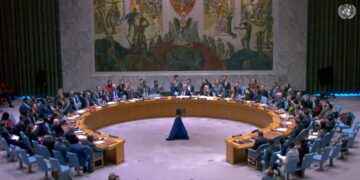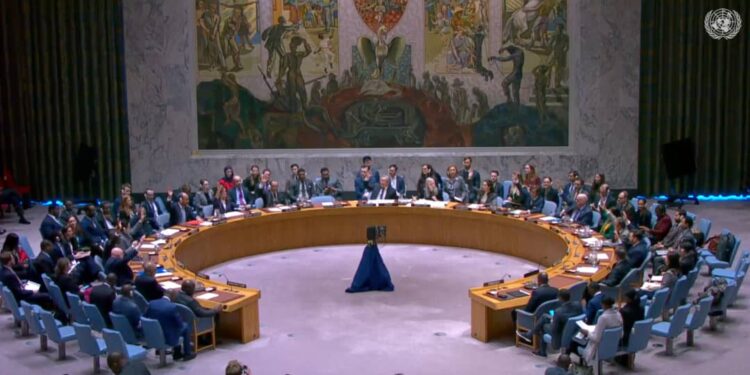The United Nations Security Council has strongly condemned the ongoing offensives by the 23 March Movement (M23) in the North and South Kivu provinces of the Democratic Republic of the Congo (DRC).
In a unanimous decision, the Council adopted Resolution 2773 (2025), demanding that M23 immediately cease hostilities, withdraw from areas under its control, and dismantle any illegitimate parallel administrations in Congolese territory.
The resolution, passed under Chapter VII of the UN Charter, also calls upon the Rwanda Defence Force to halt its support to M23 and to withdraw from the DRC without preconditions.
It further urges Kinshasa and Kigali to resume diplomatic negotiations, reinforcing the importance of regional initiatives such as the Luanda and Nairobi processes in addressing the crisis.
Additionally, the Council demanded that Kinshasa cease any military assistance to armed groups, particularly the Democratic Liberation Forces of Rwanda (FDLR), and accelerate efforts to neutralize such factions.
It also called for the urgent establishment of humanitarian corridors in North and South Kivu to facilitate the safe and timely delivery of aid to affected populations.
The Security Council reaffirmed its full support for the United Nations Organization Stabilization Mission in the DRC (MONUSCO) and warned against any actions that might hinder its mandate.
The Council also condemned the illicit exploitation and trafficking of natural resources in the eastern DRC, reiterating its commitment to the country’s sovereignty, independence, unity, and territorial integrity.
Following the adoption of the resolution, France’s representative, who drafted the text, emphasised that the measure sends a clear message: “There is no military solution to the conflict in the eastern DRC. The M23 offensive, supported by Rwanda, must end, and Rwandan forces must withdraw immediately.”
He stressed that MONUSCO must be allowed to operate without obstruction and that regional peace initiatives should be fully supported.
Several delegates highlighted the need for African-led initiatives to resolve the crisis. Algeria’s representative underscored the recent statement by the African Union’s Peace and Security Council, which called for a political settlement, and insisted that external actors must cease interference. Sierra Leone’s representative pointed to the illegal exploitation of natural resources as a major driver of instability and stressed that dialogue remains the only sustainable path to peace.
Somalia’s delegate urged an inclusive and cooperative approach, emphasizing that resolving African conflicts should not involve blame games but rather constructive dialogue and regional collaboration. The representative of China, serving as the Council’s President for February, supported African-led solutions and called for Security Council resolutions to align with regional mediation efforts.
Expressing urgency, Pakistan’s representative warned that failure to implement the resolution could lead to a full-scale regional war. He reiterated the resolution’s commitment to the DRC’s sovereignty and fundamental UN Charter principles.
The Russian Federation’s delegate also called for immediate action to end hostilities, stressing that peace depends on the parties’ willingness to adhere to the measures outlined in the resolution.
The Republic of Korea’s representative issued a stark warning, stating that the DRC is on the brink of a regional war, and called on both Kinshasa and Kigali to resume meaningful diplomatic engagement. Similarly, Guyana’s representative urged the implementation of agreements under the Luanda and Nairobi processes. Panama reaffirmed its commitment to the DRC’s territorial integrity and urged M23 to cease hostilities.
The United States representative announced sanctions against James Kabarebe, Rwanda’s Minister of State for Regional Integration, as well as M23 spokesperson Lawrence Kanyuka Kingston and two of his companies. She highlighted the importance of African-led solutions but emphasized that swift international action is also necessary.
The Congolese representative criticized the Security Council’s delay in addressing the crisis, arguing that three weeks of inaction had allowed Rwanda’s military to deepen its occupation of DRC territory. He expressed gratitude for the eventual resolution but urged immediate implementation to alleviate the suffering of civilians in occupied areas.
On the other hand, Rwanda’s representative voiced concerns about what he described as the intimidation of African voices within the Security Council. He contended that the DRC’s internal conflict cannot be solved by external actors alone and stressed that addressing Rwanda’s security concerns is critical to finding a lasting resolution.
Angola’s delegate called for an immediate ceasefire and renewed dialogue, urging all parties to uphold the progress made through the Luanda process. He stressed the Council’s responsibility to assist the people and government of the DRC in preventing further bloodshed.
The Security Council’s resolution underscores the urgent need for an inclusive political solution, adherence to regional peace initiatives, and an end to foreign involvement in the conflict. As tensions continue to escalate in the eastern DRC, the international community will be closely watching whether the parties involved adhere to the Council’s demands and work towards a lasting resolution.









